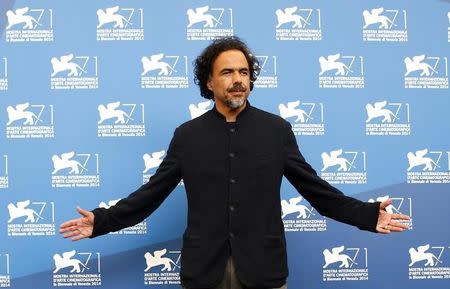Inarritu leaps off the ledge with 'Birdman'

By Michael O'Boyle MORELIA Mexico (Reuters) - As Alejandro Gonzalez Inarritu neared his 50th birthday, he took stock of his string of acclaimed, dark films, and decided to do something really scary: confront his own struggle with being an egomaniacal filmmaker, in a comedy, in a single shot. "Fear of the unknown is a great creative partner," Inarritu told Reuters at the Morelia International Film Festival. "It makes you more aware and open to circumstances that you haven’t planned for. It lets you make advantages from your limitations." What emerged from his own mid-life crisis is "Birdman," his fifth film and an absurd comedy-drama that explores how modern identity suffers from what Inarritu calls the "disease of popularity" spread by social media and a culture of celebrity. The film, which opened in limited release this weekend, is being hailed by critics as a masterpiece, a perfect fusion of form and content. Using what appears to be a single take, it tracks the breakdown of a has-been movie star who is trying to reinvent himself on the Broadway stage. The Academy award-nominated Inarritu broke from his previous style seen in "Amores Perros" and "Babel" of deploying multiple storylines and juxtaposed time frames in bleak tales of fatal accidents that intertwine the lives of strangers. "It was liberating to do comedy," the Mexican director said. "It felt like playing in a jazz band." The film is still steeped in existential angst, but it comically portrays the actor's obsession with fame. "In the times we now live, we have empowered the rest to tell us who we are," Inarritu said. "Now is a time where there are so many social networks, such need for validation ... you don't have to be a star or a politician to want to have likes or dislikes. Now there is a disease of popularity in the whole society." The camera, run by Academy-award winner Emmanuel Lubezki, weaves from dressing rooms, through hallways and out onto stage, following Riggan Thomson, played by Michael Keaton, as he rushes toward an opening night set for disaster. All the time, Thomson is trying to escape the foul-mouthed voice in his head of Birdman, the feathered superhero character from the franchise he abandoned years earlier before his career sank into obscurity. On top of the virtuoso camera work, a jazz drum soundtrack drives the film, acting as the frenetic beating of Thomson’s erratic heart as scenes move between reality and his imagination, where he has telekinetic powers and can fly. The film could be seen as a satire of actors like Keaton, who himself walked away from playing Batman, but Inarritu says he was exploring his own ego and creative process, while also skewering the superheroes of the Hollywood machine that produces "junk food" just to make money. "I had this idea based on my own personal experience of hearing my voice torturing me ... elevating me to heights and then sending me to hell," he said. "I thought it would be very interesting to explore the nature of that internal battle that we all have." Keaton's performance and Inarritu's direction are already stirring Oscar buzz, which could mark two-years running for Mexico after Alfonso Cuaron took best director this year for "Gravity," which also won Lubezki an award for cinematography. "It makes me feel like Riggan. My wings are really spreading, saying 'you are the greatest,'" he jokes. "No. I think I am very aware (the Oscars) are very subjective. And the film is about that. It is ephemeral and it is nice, but it is not the important thing." (Editing by Simon Gardner and Grant McCool)

